Christodoulos Michailidis是最早一批移居中国的外籍广告剪辑师,也是为数不多在这片土地上开拓出自己事业的人之一。
Michailidis 是塞浦路斯人,一般被人称作Tolis。在加拿大温哥华电影学院求学后,他回到了希腊,就职于制作公司Kino并斩获丰富经验。在五年的时间内,他和多位 导演都有过合作;之后他便开始了自由职业生涯,在欧洲和美国开展工作。2006年,上海制作公司观池影视邀请他为足球巨星罗纳尔迪尼奥代言的联想广告片做 剪辑。于是他在北京待了10天,每天白天待在宾馆里睡觉倒时差,到了晚上工作到很晚,然后整晚和导演Patrick Van Hautem还有观池影视的创始人张斌和张雪芹一起party。在随后的三年里,Michailides也曾6次回到中国,参与一些商业项目和音乐映像项 目,但是由于他在欧洲一直有业务稳定,所以还是一直留在欧洲。后来,欧洲经济低迷导致广告市场衰退,于是他便开始将注意力转向东方。2012年,在电影人 才智库SHP的鼓励下,他满载行囊,来到了中国广告之都上海。
时至今日,他来中国已经有4年,已经做了40多个项目。 SHP+借此机会,聆听了这位周游世界的剪辑师讲述自己在中国的早期经历,以及在过去10年中,中国市场的发展状况,在中国这样一个特殊的市场中作为剪辑师所面临的事实。
Christodoulos Michailidis was one of the first foreign commercial editors to move permanently to China and remains one of only a handful making his career in the Middle Kingdom.
A Cypriot national, Michailidis, better known as Tolis, studied in Canada at the Vancouver Film School before moving to Greece to cut his teeth with production house Kino. Following five formative years collaborating with a broad network of directors, Tolis went freelance, ushering in a period working across Europe and the US. In 2006, Shanghai production company Gwantsi brought him over to edit a film for Lenovo starring the footballer, Ronaldinho. He spent 10 jet-lagged days holed up in a Beijing hotel room working late into the evening and partying all night with director Patrick Van Hautem and Gwantsi founders Ben and Jacqueline Zhang. Though he would return to China on six occasions in the subsequent three years for commercial and music video projects, a steady flow of work from Europe kept Tolis on the move. As the economic downturn took its toll on the European commercial market though, he began to turn his attention eastward. In 2012, with encouragement from filmmaking talent representation agency SHP, Tolis packed up his life and moved to China’s commercial capital, Shanghai.
Four years on and more than 40 jobs later, SHP+ caught up with the globetrotting Tolis to hear about his early experiences in China, how the market has evolved in the past decade and the stark realities of editing in the idiosyncratic local industry.
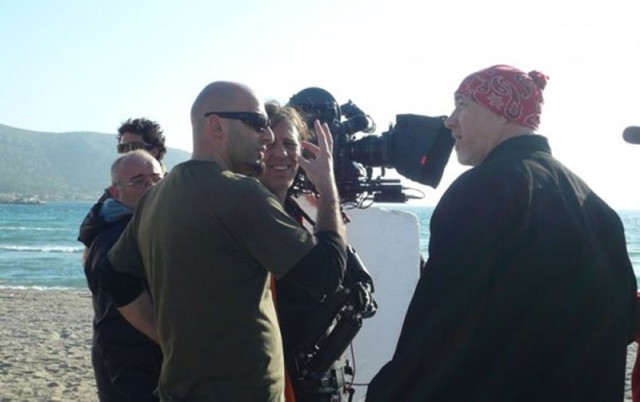 Tolis与导演Patrick Van Hautem与斯坦尼康器操作者Stephanos Kalothetos在希腊雅典的雀巢广告拍摄现场|Tolis with director Patrick Van Hautem and SteadyCam operator Stephanos Kalothetos on a shoot in Athens, Greece for Nestle
Tolis与导演Patrick Van Hautem与斯坦尼康器操作者Stephanos Kalothetos在希腊雅典的雀巢广告拍摄现场|Tolis with director Patrick Van Hautem and SteadyCam operator Stephanos Kalothetos on a shoot in Athens, Greece for Nestle
自你2006年第一次来中国以来,你觉得中国广告业发生了哪些变化?
当 时第一次和观池做项目时,我们感觉自己很特别。当时来中国的老外并不多,而且观池也不是每个项目都会请老外。感觉就像刚入行的新人一样。我们和张雪芹,还 有她哥哥张斌是很好的朋友,每天晚我们都会出去放松 – 但是最重要的是,我们都发自内心努力想做出最好的片子。之后慢慢的,中国形成了自己的市场,创意人才紧缺的现象显现出来,这也导致那些缺乏经验的客户和广 告公司自己随意决定电影的导向。外籍人员来了又去,很多钱都花了了安排他们的机票酒店上,而事实却是,导演想要什么,你就得给他剪出什么,客户想要什么, 你也得给他剪出来,现在这样的状况还是存在。制片公司得又花钱又浪费时间的为同一部片子剪出两个不同的版本。我真心希望我们尽快走出这个阶段。
How have things changed in the Chinese industry since you first came in 2006?
On that first project with Gwantsi, we felt special. You didn’t get the feeling that there were many foreign people coming in or that [Gwantsi] were doing this for every production. It felt like it was the first time. We were friends, we were having fun, we were going out every night – me, Jacqueline, her brother – but most importantly, we were all genuinely trying to make the best film possible. Then, slowly, as China became a market on its own, the shortage of creative talent allowed creatively inexperienced clients and agencies to take over the directorial decisions. Foreign talent came and went, huge amounts were (and are still) spent on plane tickets and hotel rooms, only to have directors make director’s cuts, and clients make ‘client cuts’. Production companies had to spend their own time and money to make two versions of every film. I truly hope that phase is now being put behind us.
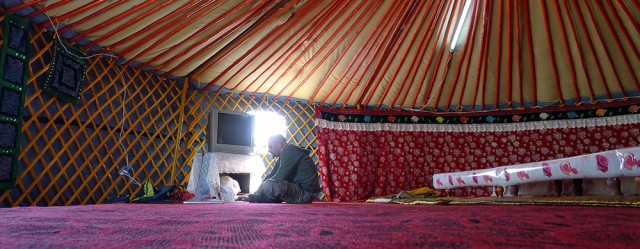 Tolis在赛里木湖畔的临时帐篷中进行大众汽车广告的剪辑工作,博尔塔拉,新疆|Tolis working in his makeshift editing tent in (Sailimu Lake) in Bortala, Xinjiang Province on a job for Volkswagen.
Tolis在赛里木湖畔的临时帐篷中进行大众汽车广告的剪辑工作,博尔塔拉,新疆|Tolis working in his makeshift editing tent in (Sailimu Lake) in Bortala, Xinjiang Province on a job for Volkswagen.
跟在欧洲相比,在中国工作主要有哪些不同?
在 中国,不用去纠结或者是争论什么是真正的创意。需要的是磨合的时间,但大家总是保险起见。总是想找一个平衡点,让大家都满意。但是这样的后果就是最后的片 子一无是处。在中国,大多数人都不得不照着分镜头去剪片子。多数时候,大家都会说,‘这跟我们之前达成的意见不一样啊?这样我没法拿给客户看啊’。所以难 点不在于把工作做完,而是怎么能做出点原创的东西。
What are the key differences between working in China and Europe?
In China, there’s no real creative struggle or fight. You need a little friction to get things done properly, but here there’s a lot of playing it safe. There’s always this sense of trying to find the place where everybody will be happy, which is generally a sure way to dilute the film down to nothingness. On most jobs in China, people are afraid to go with an edit that’s not following the board. Most times it’s ‘why isn’t this like how we agreed? I can’t show this to my client’. The hard part is not doing the job, it’s doing something original.
Tolis剪辑的宝马广告片|Tolis edited BMW Drag Race film
来中国工作,对你来说是一种文化冲击吗?
第一次来中国时,我剪完片子后,大家貌似都很满意,之后我就走了。完全没想到几周,有时候甚至是几个月之后,客户会找另一拨人重新剪辑这部片子。
一 般情况下,大家觉得工作做完了,可以各干各的了。但是即使你得到了客户的认可,他也未必就是最终拍板的人。客户经理会接手,跟公司副总裁汇报,副总裁再跟 总裁汇报,然后总裁再跟董事会汇报。而董事会的这些人,内心有自己的期待值,带着这样的对比来看我们剪好的片子。一般这时候就会有大的改动,因为没有人关 心作品。客户只会说,‘我不喜欢这个风格,再做一版’。所以根本不会看什么样的剪辑最适合片子,而是要去迎合某个人的品味。我并不是说客户不对,但是他们 提出的创意想法并没那么好,这也是为什么他们只适合做生意,不适合艺术创作的原因。如果把这个活交给一个没那么资深的人,他们经验不足,不知道该怎么改。 最后就沦为一堆零散的镜头。所以很多中国的片子最后都沦落成这样的结果。他们也不是不想做好,只是忘了做片子的初衷。
Was coming to work in China a culture shock?
The first time I came here, I edited, everybody seemed happy, and I left. I had no idea that for the next couple of weeks, sometimes even months, somebody else would sit with the client and make revisions.
There is a point when everybody thinks the job is done and go their separate ways. But the client that approved the film is not necessarily the one who has the last word. The account manager takes over, who has to deal with a vice president of the company, who has to deal with the president, who has to deal with the board. And these people, they have what they were expecting to see compared to what we are showing them. That’s where the big revisions happen, when nobody is looking after the “baby”. The client will say ‘I don’t like this guy’s taste, make me another one’. It’s not about what best serves the film, it’s about what makes someone else happy. I’m not saying the client is wrong, but his creative input is not as good, that’s why they are in business and not making paintings. If you hand it over to junior guys, they don’t have enough experience to know how to go about making the revisions. It becomes a bunch of shots, or B.O.S. A lot of films in China end up like that. It’s not that people don’t want to make a good film, it’s that they lose track of why they were doing it in the first place.
Tolis剪辑的别克广告《洗车》|Tolis edited Buick ‘Wash’ film
你是怎么应对这种情况的?
我会试着坚持参与到片子完成为止。你参与了整个过程,所以会根据自己经验来应对这样的问题。如果你坚持保护自己的作品,其实你可以保留下很多你自己的想法。如果有耐心留下来,聆听每一个人的想法,其实可以发现他们的意见对片子也有帮助。
How do you deal with that?
I try to insist that I stick with projects until the end. You’ve been through this process so you use your experience to address it. If you sit there and protect it, you can win a lot. If you have the patience to stay and try to listen to everybody, you can actually find something that is still good for the film.
中国广告行业有哪些独特之处?
中 国缺少创意自由和有创意的点子。或者说有时候不是没有创意,而是在概念呈现的阶段就被扼杀了。一部好的作品不是去复制别人,而是要充满勇气,敢去冒险开拓 未知的领域。似乎人们也会觉得,你要是问这问那,就说明你自己不努力。但是,如果你不去追问千千万万个问题,怎么能透彻理解核心的想法呢?即使一个很棒的 想法通常也都需要得到批准。从始至终整个过程都是这样。一般中国本地的制作风格和外国的制作风格之间总是有一些冲突。中国人也想采取国外的做法,但是他们 现在还不能跟客户唱反调。
What are the other unique characteristics of the Chinese industry?
There is a lack of creative freedom and ideas. Either that or the ideas are being crushed at the script pitching stage. Great films cannot be copies and it takes a lot of guts to venture into unknown territory. There also seems to be a perception that if you have to ask questions, it means you’re not working hard enough. How can the artist get to the core of the idea if they don’t ask a billion questions? People always need approval, even if they think something is cool, which bogs down the whole process. Locals may want to do the foreign style of productions, but they can’t fight their clients yet.
你希望看到哪些改变呢?
我 希望看到更多的剪辑师能做真正的剪辑师,能真正发出自己的声音,而不是拿人钱财替人做事。客户也要相信,创意人员有时候比他们懂得多。不要去花很多钱找一 些有名气的剪辑师,但是反过来又不给他们机会发挥他们自己的想法,必须要求他们按照你的想法去做。客户害怕失败,而失败在中国恰恰不是什么好事。我觉得这 跟实际做出什么作品没什么关系,是文化原因。不要给剪辑师设定那么多层级汇报,要创造扁平化的模式。一起合作,不是谁给谁打工。要想着怎么样才能最大化发 挥概念的作用,不要去想着还要向上级汇报。不要只是完成一份差事的心态。
How would you like to see things change?
I’d love to see more editors being editors, and not just get hired to do what somebody else wants them to do. Clients need to trust that creatives know something that they don’t. Don’t go out and get a big name, pay them a lot of money but then not give them a chance because they don’t do what’s in your head. Clients are afraid that it will fail, and failure is not a good thing in China. I think it’s a cultural thing, it has nothing to do with actual work. Create a horizontal, not a vertical relationship with the artist. Work together, not for one another. Focus on maximizing the impact of the idea and forget about the board. Go beyond simply trying to get the job done.
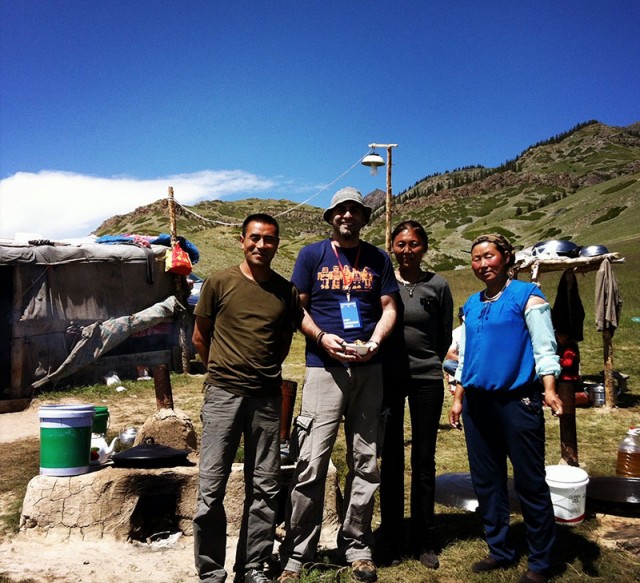 Tolis在新疆拍摄宝马广告时与当地少数民族的合影|Enjoying a break with the local minority of Xinjiang on a shoot for BMW
Tolis在新疆拍摄宝马广告时与当地少数民族的合影|Enjoying a break with the local minority of Xinjiang on a shoot for BMW
你的工作哲学是什么?
过 去15年中,我认识到,如果一直在不停地剪辑,那你会累垮的。你也需要休息。导演也如此,不能一个接一个的拍摄,也需要休息。否则作品都成了标准化的模 式,看起来都差不多了。每做一个项目,都需要找到它的不同之处和独特所在。如果跟别人做的差不多,倒是省事,你也可以跟之前做的差不多。而且这样的情况在 中国很常见,人们总会重复以前做过的。
Do you have a working philosophy?
I learned in these 15 years that if you edit all the time, you get burned out. It’s the same for directors who go shoot to shoot and don’t take a break. Their work becomes standardized and things start looking similar. Every time you do a job, you need to find out what is unique for that project. Too often people here are falling back to what they’ve seen before.
你关注过市场上其他的剪辑师吗?
我听说中国大陆剪辑师越来越多,也有很多来自台湾和香港的剪辑师。但是剪辑师都不知道彼此在做什么,也不知道大家的水平。我们是属于导演、广告公司、制片人和客户的幕后工作者,所以你没法知道每个项目中每个剪辑师到底花了多少心思,但过去几年里作品水平确实提高了。
Do you look at other editors in the market?
I hear that there are increasing numbers of Mainland Chinese editors out there and I know there are a lot from Taiwan and HK. But editors don’t know what other editors are doing. We’re hidden behind all the directors, agencies, producers and clients, so you can’t really tell how much input everybody has had on each project. The quality has definitely gone up in the last couple of years.
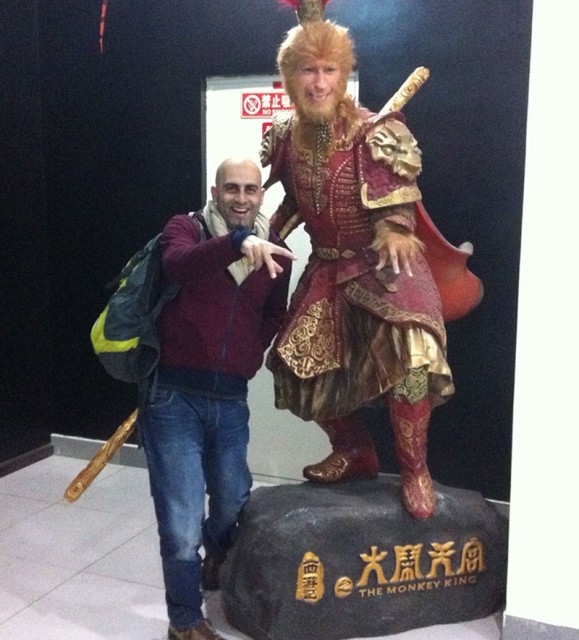 Tolis在北京VHQ后期工作室。他当时正在着手一项雀巢的工作|In the VHQ Post Production Studio in Beijing following a project for Nescafe
Tolis在北京VHQ后期工作室。他当时正在着手一项雀巢的工作|In the VHQ Post Production Studio in Beijing following a project for Nescafe
竞争压力大吗?
竞争的压力永远来自于金钱方面,而不是我的工作本身。这是一个纵向与横向结构的竞争。如果影视公司想要的是那种有自己想法,可以对片子做出贡献的人,那我觉得以我的经验来说我是当仁不让的人选。但是从纵向来说,你需要关心的就是在哪儿能赚到更多的钱,但这样结果就是不得不对客户唯命是从。
Is there much competition for work?
Competition always comes down to money and not your actual work. It’s that vertical versus horizontal structure. If a production wants to hire someone who will really have something to offer, then I’d be considered because of my experience and so on. If it’s a vertical structure, then it’s about money and where you can get the best offer, because in the end you will have to do what the client says.
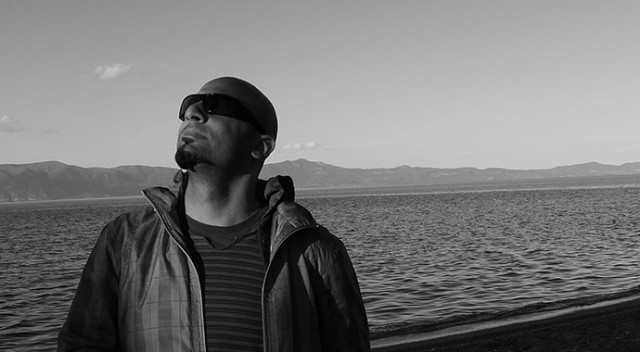
Tolis Michailidis
你觉得广告行业会朝着什么方向发展?
以前人们的思维模式都是为了赚钱,而不是怎么做出好的作品。但是现在我觉得有更多人意识到,其实不仅仅是为了赚钱。这些人以后将成为市场的主导。整体来说,这也适合中国的发展状况。
我对中国信念满满。西方现在已经疲倦了,某种意义上,我们不断重复着自己。中国文化将促使世界重新达到一种平衡。通过电影就可以看到这一点,只是现在还没有释放出来。一旦允许中国自由表达自己,你就会看到下一步的变化了。广告行业才刚刚开始不再有那么多束缚。
How do you see the industry evolving?
The mentality used to be to go and make money, not to make something nice. I think more people nowadays realise that it’s not only about money. They are the ones that will take over this market. You can apply that to China in general.
I have a lot of faith in China. The west is tired, we are sort of repeating ourselves. Chinese culture is going to rebalance the world. You can see it coming in the movies, but it’s not set free yet. Once China is allowed to express its own character then you’ll see the next step. In commercials, the leash is only just being let loose.
Tolis剪辑的雪碧《释放一夏》广告|Tolis edited Sprite’s ‘Hot City’ film
对那些可能会打算搬到中国来的外国剪辑师,你有什么建议吗?
重 新认识自我。不要自以为你什么都知道。你可能会感到很崩溃,但是我坚决认为人们应该去尝试。如果你能接受这种差异,并且坚持下去,不久你就会有很不错的感 觉。我无法想象,如果我没来中国,那我的生活会是什么样子,肯定会错过很多东西。世界的重心慢慢在转移,如果你不去了解中国的话,你就落伍了。无疑,从现 在起,中国会影响我们所做的一切事情。
What advice would you offer to foreign editors considering moving to China?
Push the reset button. Forget everything you thought you knew. It can be frustrating but I definitely think people should try it. If you can accept the differences and stick through it, it will be great in the near future. I cannot imagine what life would have been like if I hadn’t come here, I would have missed out on so much. The world is shifting and you’re left out of it if you don’t understand this part of the world. China will definitely affect everything we do from now on.
- 更多Tolis的作品,请查看:http://shp.tv/talent/tolis-michailidis/
- To see more Tolis’s work, please check:http://shp.tv/talent/tolis-michailidis/




 BAM Music Library Brings Edgy, Indie Sounds to Chinese Creatives
BAM Music Library Brings Edgy, Indie Sounds to Chinese Creatives
